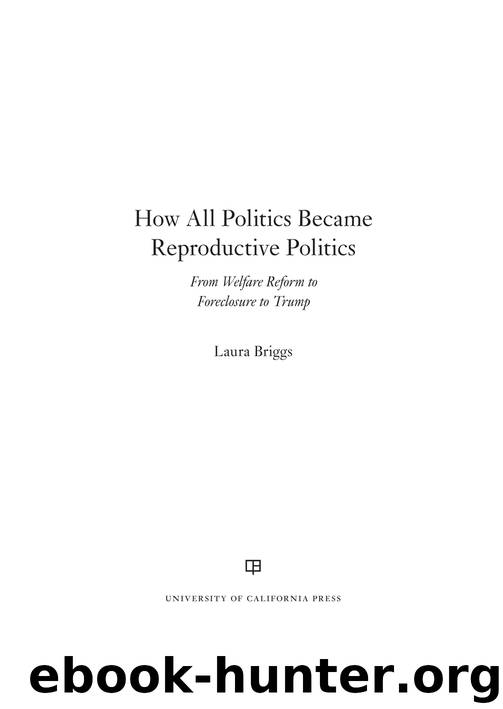How All Politics Became Reproductive Politics: From Welfare Reform to Foreclosure to Trump by Laura Briggs

Author:Laura Briggs [Briggs, Laura]
Language: eng
Format: epub
Tags: Social Science, Gender Studies, Feminism & Feminist Theory, History, Social History
ISBN: 9780520957725
Google: QSwtDwAAQBAJ
Amazon: B074CVRF6F
Publisher: Univ of California Press
Published: 2017-09-12T00:50:44.895000+00:00
GAY AND LESBIAN PARENTS
For the courts and queer folks alike, one of the most important questions animating the quest for gay marriage has been the protection of gay and lesbian parental rights. There have, of course, been gay parents as long as there have been gay people: People who stayed in heterosexual marriages so they could keep their kids. Lesbians who did heterosexual sex work for the money and inadvertently but not necessarily unhappily got pregnant. Beginning in the late 1960s, with the intensification of a gay liberation movement, lesbians and gay men came out to a small circle of friends or a larger, more public one, left heterosexual marriages, and fought to keep custody of their children or at least visitation rights even when their ex knew or suspected that they were gay. Others went underground, taking their children and running, hiding from ex-spouses. By the 1970s, some parents and lawyers were organizing groups like the Lesbian Mothers’ Defense Fund, the Lesbian Mothers’ Union, the Lesbian Rights Project, and Lambda Legal Defense to help provide expert witnesses, lawyers, and financial support. Still, until at least the mid-1980s, mostly these gay parents lost their children in custody hearings or agreed to settle without going to court, preserving visitation by not asking for custody, or agreeing to custody without child support (lest this sound like ancient history: as I write this in 2017 as a university professor, there is currently a cohort of children of queer parents the age of my students who are not able to go to college or are attending less expensive schools closer to home because of those nonsupport agreements).5
The activist organizations and literature of the gay movement of the 1960s and ’70s are suffused with this melancholic legacy of lost children. Bruce Voeller founded the National Gay Task Force and was its executive director at a time when he was engaged in a very public battle to maintain visitation rights with his children. It was a fight he ultimately won, but with restrictions that left his children out of his life in any meaningful way: they could not go to his home, meet his lover, or go to any locations where other gay men were present. Abilly Jones-Hennin, founder of the National Coalition of Black Gays, was also a father and organized gay parents’ groups in the Washington, DC, area. Among the five demands of the 1979 March on Washington for Lesbian and Gay Rights was this one: “End discrimination in lesbian mother and gay father custody cases.”6 Minnie Bruce Pratt’s collection Crime Against Nature, which received a prestigious designation as a Lamont Poetry Selection from the Academy of American Poets, found its title in the sodomy laws that made it unthinkable that she would be able to keep her boys; she relinquished them to her ex-husband in order to preserve visitation. It contains these lines:
Download
This site does not store any files on its server. We only index and link to content provided by other sites. Please contact the content providers to delete copyright contents if any and email us, we'll remove relevant links or contents immediately.
The Secret History by Donna Tartt(19083)
The Social Justice Warrior Handbook by Lisa De Pasquale(12190)
Thirteen Reasons Why by Jay Asher(8907)
This Is How You Lose Her by Junot Diaz(6885)
Weapons of Math Destruction by Cathy O'Neil(6279)
Zero to One by Peter Thiel(5798)
Beartown by Fredrik Backman(5751)
The Myth of the Strong Leader by Archie Brown(5507)
The Fire Next Time by James Baldwin(5441)
How Democracies Die by Steven Levitsky & Daniel Ziblatt(5218)
Promise Me, Dad by Joe Biden(5153)
Stone's Rules by Roger Stone(5087)
A Higher Loyalty: Truth, Lies, and Leadership by James Comey(4959)
100 Deadly Skills by Clint Emerson(4924)
Rise and Kill First by Ronen Bergman(4788)
Secrecy World by Jake Bernstein(4751)
The David Icke Guide to the Global Conspiracy (and how to end it) by David Icke(4717)
The Farm by Tom Rob Smith(4506)
The Doomsday Machine by Daniel Ellsberg(4489)
